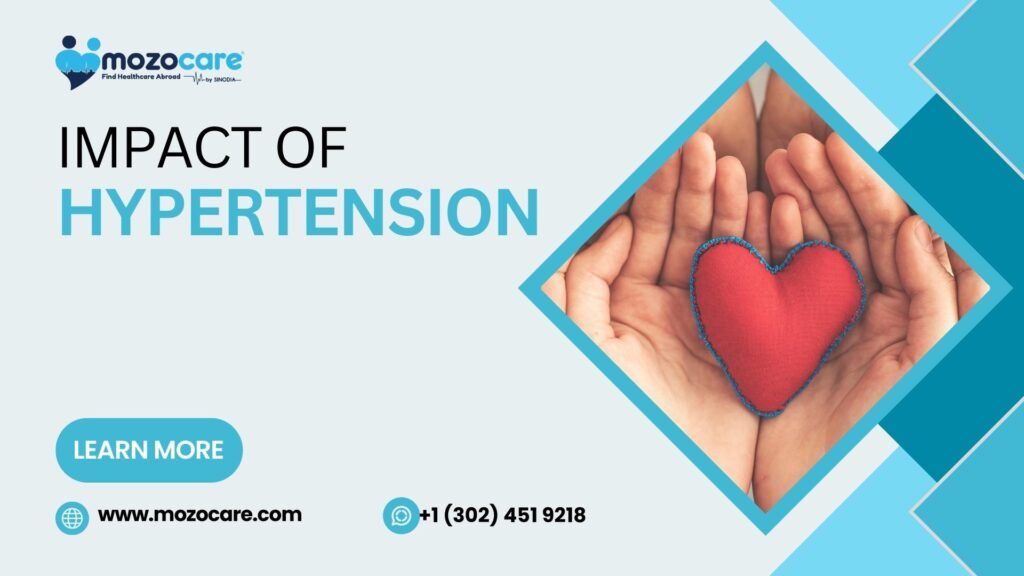
World Hypertension Day is observed on May 17th each year to raise awareness about hypertension, commonly known as high blood pressure. Hypertension is a global health concern that affects millions of individuals, often without presenting noticeable symptoms.
This article aims to delve into the impact of hypertension on the heart, kidneys, and other vital organs, highlighting the importance of early detection, prevention, and management of this silent killer.
Hypertension is a chronic medical condition characterized by elevated blood pressure levels persistently exceeding the normal range (systolic blood pressure above 130 mmHg and/or diastolic blood pressure above 80 mmHg). Uncontrolled hypertension can lead to detrimental effects on various organs throughout the body.
The heart is a vital organ responsible for pumping oxygenated blood to the entire body. Hypertension puts excessive strain on the heart, leading to various complications:
a) Increased Risk of Heart Disease: High blood pressure causes the heart to work harder, leading to the thickening of the heart muscle (left ventricular hypertrophy). This increases the risk of developing heart diseases such as coronary artery disease, heart failure, and arrhythmias.
b) Stroke: Hypertension is a major risk factor for stroke. Elevated blood pressure weakens the blood vessels in the brain, making them more prone to rupture or blockage, leading to ischemic or hemorrhagic strokes.
c) Atherosclerosis: Chronic hypertension damages the inner lining of blood vessels, promoting the accumulation of cholesterol and other substances, resulting in the formation of plaques. These plaques can narrow and harden the arteries, leading to atherosclerosis, which increases the risk of heart attacks and strokes.
The kidneys play a crucial role in maintaining fluid balance, regulating blood pressure, and filtering waste products from the blood. Hypertension adversely affects kidney function:
a) Chronic Kidney Disease (CKD): Uncontrolled hypertension damages the blood vessels in the kidneys, impairing their ability to filter waste products effectively. Over time, this can lead to the development of chronic kidney disease, which may progress to kidney failure requiring dialysis or transplantation.
b) Renal Artery Stenosis: Hypertension can result from the narrowing of the renal arteries (renal artery stenosis). This condition restricts blood flow to the kidneys, triggering the release of hormones that further raise blood pressure, creating a vicious cycle
Beyond the heart and kidneys, hypertension exerts detrimental effects on various other vital organs:
a) Brain: Chronic high blood pressure damages the blood vessels in the brain, contributing to cognitive decline, vascular dementia, and an increased risk of Alzheimer’s disease.
b) Eyes: Hypertension can cause damage to the blood vessels in the retina, leading to hypertensive retinopathy, which may result in vision impairment or even blindness if left untreated.
c) Blood Vessels: The constant pressure exerted by hypertension weakens and damages blood vessels throughout the body, making them prone to aneurysms and peripheral artery disease.
d) Sexual Health: Hypertension can disrupt normal blood flow to the genital area, leading to erectile dysfunction (impotence) in men and sexual dysfunction in women.
World Hypertension Day serves as a reminder to raise awareness about the silent yet devastating impact of hypertension on vital organs such as the heart, kidneys, brain, eyes, and blood vessels. Early detection, lifestyle modifications, and appropriate medical interventions are essential to prevent and manage hypertension effectively. By adopting a healthy lifestyle, regular exercise, maintaining a balanced diet low in sodium, reducing stress levels, limiting alcohol consumption, and avoiding tobacco use, individuals can significantly lower their risk of developing hypertension and its associated complications.
Regular monitoring of blood pressure, routine check-ups, and adherence to prescribed medications are vital for managing hypertension and preventing further damage to vital organs. It is crucial to consult with healthcare professionals who can provide personalized guidance and treatment plans tailored to individual needs.
Public health initiatives, educational campaigns, and community outreach programs play a crucial role in raising awareness about hypertension. Encouraging individuals to undergo regular blood pressure screenings, promoting healthy lifestyle choices, and providing access to affordable healthcare are essential steps in combating the global burden of hypertension.
Furthermore, healthcare systems and policymakers should prioritize the development and implementation of comprehensive strategies to address hypertension. These strategies may include improved access to healthcare services, early detection programs, affordable medications, and policies aimed at reducing the population’s overall blood pressure levels.
In conclusion, hypertension poses a significant threat to the health and well-being of individuals worldwide. Its impact extends beyond the heart and kidneys, affecting vital organs such as the brain, eyes, and blood vessels. By understanding the implications of hypertension on these organs, individuals can take proactive measures to prevent its onset or effectively manage the condition. World Hypertension Day serves as a powerful reminder to prioritize our cardiovascular health, promote awareness, and work collectively towards reducing the global burden of hypertension. Together, we can combat the silent killer and pave the way for a healthier future.
In conjunction with World Hypertension Day, Mozocare encourages individuals to prioritize their health and take proactive steps in managing hypertension. Regular check-ups, early detection, and adopting a healthy lifestyle are essential in preventing and managing this silent killer.
Mozocare, a leading healthcare platform, offers comprehensive resources and access to a network of healthcare providers specializing in hypertension management. Whether you need expert consultations, diagnostic tests, or personalized treatment plans, Mozocare is here to support you on your journey towards better health.
Visit our website or download the Mozocare app to explore our range of services and connect with trusted healthcare professionals. Together, let’s take control of our cardiovascular health and work towards a future free from the complications of hypertension.
Remember, your health matters. Take action today for a healthier tomorrow with Mozocare.